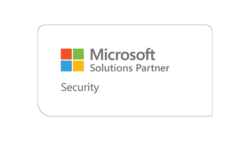Phishing Protection & Simulation
Help your employees become cyber security aware so that they can contribute to protecting your organisation from the most common type of cyber-attack: phishing.
Phishing attacks, whereby cybercriminals send emails, text messages or instant messages containing malicious software (malware) or links to harmful websites, to groups of unsuspecting recipients, remain by far the most common and widespread type of cyber-attack today. A form of social engineering in which threat actors try to steal confidential, sensitive or personal information, a successful phishing campaign can, in the worst-case scenario, lead to a damaging and extremely expensive ransomware attack.
While filters mostly prevent such emails from reaching their intended targets, the sheer volume of global daily email traffic means that huge numbers of suspicious emails still drop into people’s work and personal inboxes every day. When employees are focused on their work, are unguarded or are thinking about other things (perhaps the very topic in the email’s subject heading), they can often open a harmful email and click before they realise what they’ve done. Many are unaware that the links pose a risk to their organisation.
Our Phishing Protection & Simulation service is designed to help organisations train their team members to be much more aware and guarded when it comes to cyber security. We run tailored campaigns to test your employees’ ability to recognise unsafe emails and show how they should respond, which ultimately empowers them to help protect your business. Rather than increasing the overall risk exposure of your organisation, we give them the knowledge to act appropriately and decrease your risk.
Cybercriminals always want to find the easiest way to breach IT systems, so why not turn what could be your weakest link into another line of defence to keep them out?
This service complements our Vulnerability Management service, which focuses on your IT environment.
The latest in Phishing: a growing threat for all industries
According to The Cyber Security Breaches Survey the most common type of cyber-attacks by far are phishing attacks – staff receiving fraudulent emails or being directed to fraudulent websites. Phishing attacks are also typically the single most disruptive cyber-attacks that organisations face.
81%
of charities identified the most common attack was fraudulent emails or being directed to fraudulent websites
86%
phishing attacks up from 72% to 86% over a 4-year period from 2017 to 2020
67%
of businesses consider phishing attacks by far the most disruptive types of attack that organisations face

Giving you clarity
Providing real-time awareness of phishing attacks across your whole organisation, powered by Quorum Cyber’s Clarity platform.
With Clarity, the power and knowledge around the customers’ business’ own cyber security is placed firmly in their own hands, something which is just the start of what we view as taking Clarity to the next level and, ultimately, delivering the perfect tool to help Quorum Cyber and their customers become valued cyber security partners.
Kerry Finlayson, Head of Engineering
Your trusted partner for Phishing Protection & Simulation
Raise the security awareness levels across your teams
Empower your employees to act as another line of defence
Protect your data, your customers’ data and your employees’ personal information
Steadily strengthen your overall security posture
Continually reduce your overall risk
Safeguard your business, your trust and your reputation
Phishing FAQs
Phishing attacks remain one of the biggest and most widespread cyber security threats facing businesses. We answer the questions commonly asked by our customers on Phishing attacks and provide guidance on protecting your organisation from these malicious email attacks.
What is phishing?
Phishing is a type of social engineering attack often used to steal user data. This can include login credentials, credit card numbers and other sensitive banking information as well as a vast range of other sensitive data types.
It occurs when an attacker, masquerading as a trusted entity, dupes a victim into opening an email, instant message, or text message.
What are the most common types of phishing attacks?
Deceptive phishing is by far the most common type of phishing attack, this is where an attacker will mimic a legitimate company email format/structure in an effort to prompt victims into handing over data.
Spear phishing attacks are specifically tailored to one recipient. Using knowledge gained from a target’s social media profiles and other public information, a threat actor can craft a legitimate-looking email to trap the victim into responding. This, again, plays on the sense of urgency felt by the victim.
Whaling is an attempt to impersonate high-level employees (CEO, CTO etc.) by gaining access to their email accounts or through spoofing. Most employees will not question a request from a senior figure within an organisation, this type of attack can effectively put the entire business at risk.
Vishing is a type of attack done through Voice over IP (VoIP) such as direct calling.
Similar to Vishing, Smishing is done over the phone but in the form of SMS/text messages.
Many phishing emails contain a link to download malware, sometimes in the form of ransomware.
What is the impact of a phishing attack?
Aside from the obvious loss of money and sensitive data, there are a few serious considerations that must be taken into account when trying to assess the impact a phishing attack can have on your business.
Perhaps the largest impact a phishing attack can have on an organisation is the reputational damage it will cost. Falling prey to a breach or attack severely compromises the trust that customers will have in your brand, particularly, if the result of said breach was the loss of sensitive customer data. This can obviously result in a serious loss of custom.
The value of a company can also be seriously hampered as investors become more nervous and unsure around your business, resulting in a drop-in appetite for investment and development.
There will, no matter how big or small a breach or attack is, be some degree of business disruption/disruption of service while your organisation directs the necessary time, funds and resources required to address the effects of the attack. This, again, can have an impact on the overall trust in your brand as customers are now witnessing other, seemingly unrelated, effects to the current service.
Will you also run phishing tests on our users?
Yes! Quorum Cyber has built a phishing simulation platform that enables us to regularly send phishing emails to your users in order to raise awareness and help train and deveop their muscle memory to better detect attacks.
Explore our latest content and resources
Here you will find our latest news, comprehensive technical blog and thought leadership on developing cyber security related issues.







